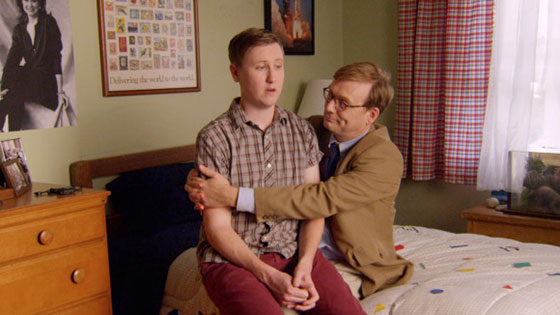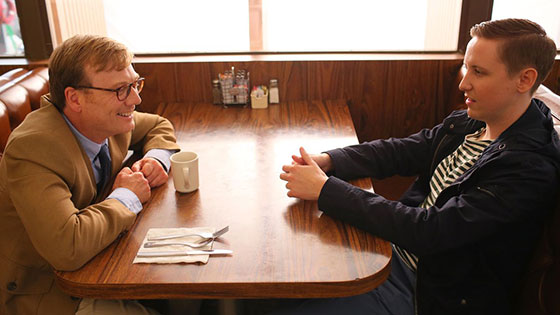‘Review 2×02: Curing a Gay, Joining the Mile-High Club’ Review
“Well, I’m off to, uh, I’m off to cure a gay person.”
With those words of trepidation, Forrest embarks on another adventure to do something he’s ignorant of in the extreme and clearly, deeply doesn’t want to do. His approach to “curing” Tim, a young man rejected by his family over his sexuality, is a stomach-churning brew of therapeutic quackery, projection, and intensely bleak denial. Again and again Forrest relates Tim’s struggle to avoid sexual attraction to his own struggle to forget his ex-wife, Suzanne. Forrest believes he’s moved on, but even Tim can see through Forrest’s rickety and recursive justifications to the ongoing hurt in the bumbling reporter’s heart. Forrest’s staggering lack of self-awareness is one of the show’s linchpins, and ‘Curing a Gay; Joining the Mile-High Club’ plays it for all that it’s worth.
Forrest’s running qualifier of “nearest my dad’s house” in relation to the places he visits on his investigative trips is a sad reminder of just how far he’s fallen. From happily married and eager to experience life to living with his father and trudging around a city where, to all appearances, he is unknown. None of what he’s done has ingratiated him to the world around him, which remains flatly repulsed by and hostile toward his bizarrely square performance art of a life. And with good reason. Season 2’s second outing is a good reminder that Forrest is far from the objective observer and reviewer he sees himself as. Indeed, he drags the entire creaking, rotten weight of his wreck of a personal life into every room he enters and utterly fails to see how it blinkers his viewpoint.

“You vanished from the face of the Earth until a dog found you sleeping under a church,” says Forrest’s reptilian producer, Grant (a wryly amoral James Urbaniak), when Forrest balks at the moral implications of trying to cure a gay man of his homosexuality. Stepping up Grant’s role in Review has paid deeply ugly dividends. Not only is he a vicious dig at the callousness of reality TV, he’s also a font of singularly horrifying pep talks. “Are you so homophobic that you don’t think a gay man can do what you do just because he’s gay?” he berates Forrest in between asserting that Forrest’s life, a scorched crater, is “back on track,” and alternately stroking and strangling Forrest’s fragile ego. He plays directly to Forrest’s deep denial, offering vital nourishment to the delusions that protect Forrest from the black pit of despair at the core of his being.
“Tim was a gay man who didn’t want to be a gay man,” Forrest narrates blithely at first meeting the one and only respondent to his leaflet campaign for a cure to homosexuality. “Unlucky for him, but a very lucky break for this review.” Tim, it’s clear, sees Forrest for the fraud he is, but he’s incapable of just saying no until a friendly stripper (hired by Forrest in a bid to turn Tim on to women) takes him to a gay bar and gives him the confidence he needs to live comfortably as himself. Forrest, of course, seizes on the exact wording of Tim’s explanation of his night at the gay bar to convince himself that Tim has, in fact, been cured and that transitively he has defeated his deep terror and shame over the loss of his family. Forrest’s sense of triumph as he walks away from Tim is the transitional point which moves the episode’s driving comedic device from denial to Forrest’s own use of his show as a license to harm and dehumanize the people around him.

Asked to join the Mile-High Club, Forrest hits on the brilliant idea of bringing along his new girlfriend, Shampoo (one of the strippers he hired), on his flight to San Francisco where he’s scheduled to pick his son up for the weekend. Mary Birdsong brings a breakably angry energy to her character that helps sell first her disgust at Forrest’s suggestion that they go for a quickie in the bathroom and second her deep hurt at realizing that Forrest is just like every other man she’s dated. It’s a dark moment, Shampoo crying in an airplane seat as a visibly frustrated and impatient Forrest gets up and begins awkwardly cruising the flight for another shot at completing his review.
Forrest sees himself as an arbiter of human experience. By denying him an easy road to completing his review, Shampoo goes from human to impediment in a few seconds flat, but despite his inhuman tendencies Forrest has the square, dorkily-charming affect he needs to make a small sampling of random strangers trust him on sight. He exploits a genuine moment of connection with a stranger in an attempt to leverage sex, but her reluctance to disobey the Fasten Seatbelt sign drives him to pressure her until she rejects him completely. “Beth could obviously disregard many of society’s guidelines for how to behave, but not, for some reason, the seatbelt sign.” It’s a good bit, but like all of Review‘s best jokes it’s also a door into how quickly mundane experiences can translate into true horror.
Thwarted and broken up with yet again by a woman he just met (Mary Birdsong’s visible pain and frustration on Suzanne’s porch might be the episode’s acting high-water mark), Forrest first blusters to an uncertain Suzanne that of course he can provide their son with a safe home environment and then goes on to pick up a sex worker and pay her to accompany him on his flight home and induct him into the Club. The image of Forrest screwing up his face in concentration and disgust as he prepares to have public sex in front of his own son (Margaret, like Beth, holds the Fasten Seatbelt sign as sacred) is soul-witheringly awful. A. J., in the show’s closing segment, is quick to point out that Forrest conducted himself like a monster on both flights. Forrest concurs. “There was no way of editing that,” he says heavily, his eyes a little deader than they were last week, “that didn’t make it seem horrifying.”











































